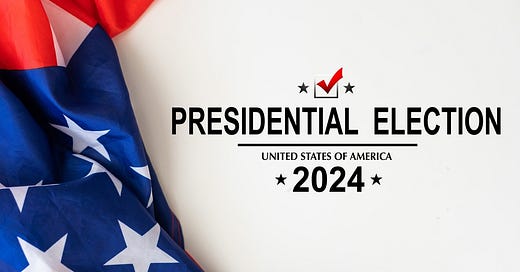Online history being made with the first 2024 GOP primary debate
Plus, where the candidates stand on tech issues from AI to TikTok and content moderation
Tonight is a milestone in the 2024 U.S. election - the first GOP primary debate. A starting gun, if you will, for the next chapter of campaigning. And I screwed up. Well, sort of. See, I’m heading to Dublin with friends tonight to see Notre Dame play Navy on Saturday. When I booked these tickets, I didn’t know I would be somewhere over the Atlantic when the candidates took the stage. Let's hope the wifi and televisions are working.
Beyond just the political geek in me, there’s another reason I’m paying close attention to this debate - it’s making some online history.
Some of you might remember the CNN/YouTube debates back in 2007 where famously, a snowman asked a question about climate change. That was the first time an online platform co-hosted a presidential debate.
From then on until the 2020 election, online platforms were tripping over themselves to participate in the debates. I’ve got a history in the tech and elections primer Collier Fernekes, and I released last Fall, but Google and Facebook hosted debates in 2011/2012. Google, Facebook, and Twitter had huge presences in 2015/2016. Come 2019; only Twitter officially did something.
We were SO proud at Facebook in August 2015 that our logo was behind all the candidates on stage. We had a huge presence in the spin room, and Donald Trump even used Facebook Live for the first time when he landed in Cleveland. We were on top of the world.
Me in the debate audience for the August 2015 Fox News/Facebook debate in Cleveland.
Mainstream online platforms’ relationship with politics has changed considerably since then, but it doesn’t mean this debate isn’t making online history too.
First is that Rumble - an online streaming platform that caters to those on the right - is the official streaming partner for the first two debates. As the Hill reports, “A Pew Research Center study conducted in May 2022 found that 20 percent of U.S. adults had heard of Rumble, with 2 percent saying they regularly get news on the platform. Among those who regularly get news on the platform, 76 percent identified as Republican or Republican-leaning.”
Second, the RNC invited the gentleman from the popular Ruthless podcast to do a pre-game show in Milwaukee. They’ll be streaming it on YouTube starting at 5:30 pm Eastern/4:30 pm Central, and I imagine posting it to their podcast channels afterward. Regular readers know my obsession with podcasting and how I don’t think it’s getting enough attention as a campaign tool. Just look at some of the folks in this list of the 40(ish) most important people in podcasting. Republicans are increasingly producing their own content around major moments like this. The guys were recently taped in Iowa and did a live show at Erick Erickson’s event.
This reminds me of the general election debates 2016 when the Trump team not only did their own programming before and after the debates but also bought the rights to the debate stream to show people on their Facebook page. At times it had more viewers than the ABC News stream we at Facebook were linking to from our home page. That was one of the moments when I realized Trump might actually win the election.
This time around, Trump is famously not attending the debate. Instead, he apparently filmed an interview with Tucker Carlson that will be released - I’m assuming on X - at the same time as the other candidates take the stage.
(Speaking of Trump and Twitter, media organizations are pushing to get more information unsealed about the search warrant for his Twitter account.)
I imagine there’s a chance that Trump might also post on Truth Social - perhaps even in real-time - which would also be a first.
In addition to how people use online tools to watch, provide analysis, and engage with the debate, I’m also keeping an eye out if any questions on tech issues get asked. I wouldn’t be surprised if they come up, though I doubt they will be at the top of the priority list.
To help get a lay of the land, I asked friend and freelance policy consultant to Anchor Change, Ana Khizanishvili, to assemble a grid you can access here. In it, you can understand where the candidates stand on issues from artificial intelligence, TikTok, and content moderation. We also noted if they’ve interviewed Ruthless and/or Carlson if they’ve used AI in their campaigns, and what social media platforms they are on.
Another helpful resource is this wrapup from the Washington Examiner in June of the candidates’ stances on tech issues.
Enjoy the debate!






